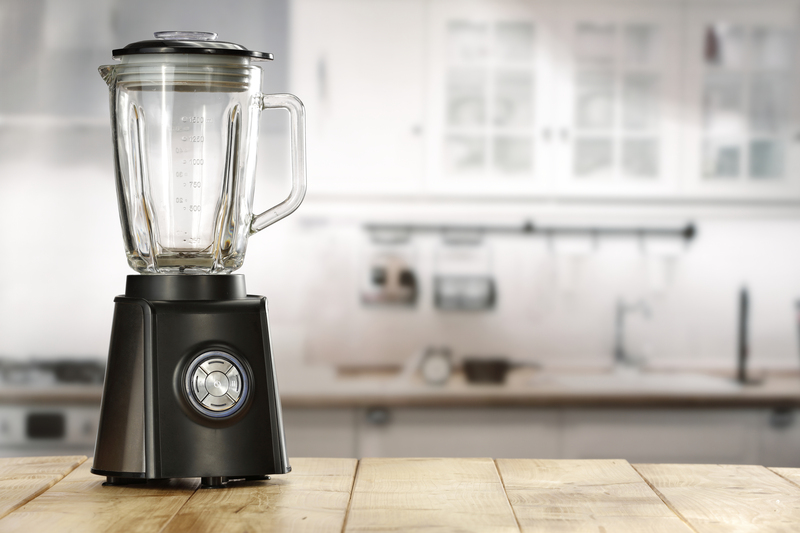Win the Battle Against Pet Smells to Refresh Your Home
Posted on 12/09/2025
Win the Battle Against Pet Smells to Refresh Your Home
Pets fill our homes with love, warmth, and companionship, but let's face it: they can also bring unwanted pet odors that linger long after playtime ends. If you're looking for effective ways to eliminate pet odors and keep your living space fresh, you've come to the right place. In this comprehensive guide, you'll discover how to win the ongoing battle against pet smells and restore your home's natural freshness.

Understanding the Sources of Pet Smells in Your Home
Before learning how to get rid of pet odors, it's crucial to understand where these smells originate. The most common pet smell sources include:
- Urine and feces accidents: Even the best-trained pets can have accidents, leaving behind persistent odors.
- Pet fur and dander: Shed fur and dead skin can collect on surfaces, trapping odors over time.
- Bedding and toys: Fabrics easily absorb smells from drool, sweat, and occasional accidents.
- Litter boxes, cages, and tanks: These pet zones can flood your home with strong scents if not cleaned frequently.
- Wet dogs or cats: After a walk in the rain or a dip in the pool, that signature "wet dog smell" can fill the air.
By identifying the exact source of pet odors, you'll be better equipped to tackle the root issue, not just mask it.
Staying Ahead: The Importance of Routine Cleaning
Consistency is your best defense against lingering pet smells. Developing a regular cleaning schedule can prevent odors from taking over:
- Vacuum frequently: Use a vacuum with a HEPA filter to capture fur, dander, and dust. Focus on carpets, rugs, upholstery, and pet hangouts.
- Wash pet bedding, blankets, and toys weekly: Use hot water and an enzyme-based detergent to neutralize odors.
- Clean food and water bowls: Prevent bacterial growth by washing pet dishes daily.
- Maintain litter boxes and cages: Scoop daily, change litter as recommended, and perform deep cleans weekly.
Pro Tip: Always follow care instructions on fabrics to avoid damage, and ensure products are pet-friendly.
How to Neutralize Pet Odors Effectively
To refresh your home from pet odors, sometimes you need more than simple soap and water. Here are proven methods to truly eliminate pet smells:
1. Enzymatic Cleaners: Your Secret Weapon
Enzymatic cleaners break down the organic compounds in pet messes, ensuring odors and stains are completely removed rather than just masked. They're especially effective against urine, feces, or vomit stains.
- Apply the cleaner directly to the affected area.
- Let it sit as per instructions to allow enzymes to work.
- Blot and rinse afterward for best results.
Tip: Test any new cleaner on a small spot first to check for discoloration or damage.
2. Baking Soda: The Natural Odor Absorber
Baking soda is a tried-and-true remedy to refresh fabrics, carpets, and even upholstery. Simply sprinkle it liberally over the offending area, let it sit for at least 15-30 minutes (or overnight for deep odors), then vacuum thoroughly. Baking soda naturally absorbs odor, leaving your home smelling cleaner.
3. Vinegar Solutions
A mixture of equal parts white vinegar and water can help eliminate dog odors and cat smells from hard floors, tiles, and walls. Vinegar neutralizes alkaline odors and evaporates quickly.
- Spray on affected surfaces and wipe clean.
- For persistent smells, repeat as needed.
Important: Avoid using vinegar on natural stone or delicate surfaces, as it can cause etching.
4. Activated Charcoal and Odor Absorbers
Activated charcoal traps and neutralizes odor molecules in the air. Place small bags or containers of activated charcoal in areas where pet odors linger -- litter areas, near pet beds, or in rooms that need freshening.
5. Air Purifiers and Deodorizers
Modern air purifiers with HEPA and carbon filters can remove tiny pet dander particles and pet-related odors from the air. Choose units rated for the room's size and run them continuously for best results. Also, look for pet-safe deodorizers to give your home a pleasant scent without aggravating your pet's sensitive nose.
The Hidden Culprits: Furnishings and Floors
Soft surfaces like carpets, curtains, and upholstery can become odor magnets. Here's how to target them and win the pet odor battle:
Deep Clean Carpets and Rugs
- Steam clean regularly: Hot water extraction removes deep-set pet hair, dander, and odor particles.
- Use a pet-specific carpet shampoo: These are crafted to handle tough smells and are safe for four-legged inhabitants.
Rental carpet cleaners can be a cost-effective option to tackle large rooms periodically.
Refresh Upholstery and Curtains
- Wash removable covers: Use a hot wash if possible and line-dry in sunlight for extra odor fighting.
- Spray with fabric-safe odor neutralizers: These products help with in-between washes.
For delicate or non-removable fabrics, consult a professional upholstery cleaner at least once a year.
Hardwood and Tile Floors
- Clean up accidents promptly: Pet urine can soak into hardwood, causing both odors and staining if not addressed quickly.
- Use enzyme treatments or vinegar solutions: Clean and mop to neutralize smells.
Addressing the Overlooked Areas
Sometimes, pet odors linger in places you might not think of right away:
- Baseboards and walls: Give these a wipe-down with gentle cleaners, especially near litter boxes or pet crates.
- Heating and cooling vents: Vacuum and clean vent covers -- fur and dander can collect and circulate odors through your HVAC system.
- Closets and under furniture: Deep clean periodically to remove hidden smells and buildup.
Grooming: A First Line of Defense Against Pet Smells
Maintaining your pet's hygiene isn't just good for them -- it's crucial for a fresh-smelling home. Here's how to stay ahead of odors with regular grooming:
- Bathe your pets regularly, but not too often (every 4-6 weeks, or as recommended by your vet) to avoid drying out their skin.
- Brush fur daily: This prevents shedding and helps keep dander at bay.
- Clean their paws after walks: This stops dirt and outside odors from infiltrating your home.
- Dental hygiene: Brushing your pet's teeth reduces mouth odors and is vital for their overall health.
If your pet is prone to ear infections or skin issues, address them promptly to prevent chronic smells.
Managing the Most Stubborn Pet Odors
What to Do About Cat Urine Smells
Cat urine is notoriously difficult to remove due to its high ammonia content. For best results:
- Blot up as much as possible immediately.
- Use an enzyme-based cleaner specifically for cat urine -- never use ammonia cleaners, as these can intensify the smell.
- Repeat treatments as necessary; persistent stains may require professional cleaning.
- If the smell is in porous materials (like wood or drywall), sealing the area after cleaning with shellac-based primer can prevent the scent from resurfacing.
Combating "Wet Dog" Smell
- Bathe your dog after swimming or rain, and dry thoroughly -- moisture promotes bacteria and odor.
- Use dog-specific deodorizing sprays or wipes between baths.
- Wash collars and harnesses regularly -- they often hold onto odors even when your pet is clean!
Pet Odor Solutions for Multi-Pet Households
If you have several pets under one roof, managing odors becomes especially challenging.
- Designate pet-friendly areas: Use washable, easy-to-clean floors and furnishings in these zones.
- Invest in extra air filtration: Consider one purifier per high-traffic area.
- Stagger grooming and cleaning tasks so the workload doesn't become overwhelming.
- Ask family members to pitch in -- keeping a fresh home is a team effort!
Natural Remedies to Safely Refresh Your Home
- Open windows frequently to let stale air out and fresh air in.
- Simmer citrus peels, cinnamon sticks, or cloves on your stove to mask leftover pet smells with inviting, natural scents.
- Use essential oil diffusers carefully: Some scents are toxic to pets (like tea tree, clove, or eucalyptus), so always research and use with caution.
Note: When choosing any remedy, always consider your specific pet's sensitivities or health concerns first.
Preventing Future Pet Smells: Smart Long-Term Strategies
- Train pets to use specific areas for bathroom needs -- consistency makes accidents less likely.
- Choose stain-resistant and easy-to-clean surfaces if possible during home renovations.
- Invest in high-quality pet bedding that is antimicrobial and machine-washable.
- Encourage proper ventilation -- ceiling fans and bathroom exhausts help disperse pet-related humidity and smells.
By staying proactive, you'll avoid the frustration of playing catch-up with persistent odors.

When to Call a Professional
If you've tried everything and pet odors persist, especially after deep cleaning, it may be time to consult a professional. Lingering smells embedded in carpets, subfloors, or air ducts often require commercial-grade treatments or ozone machines. A professional can assess your needs and help restore your home's freshness for good.
Conclusion: Win the Fight Against Pet Odors and Enjoy Your Home Again
Pet ownership is immensely rewarding, but those pesky pet smells don't have to be part of the package. By staying diligent about cleaning, addressing odors at their source, and using smart prevention strategies, you can win the battle against pet smells and revitalize your living spaces.
Your home can be clean, welcoming, and fresh -- even with your furry best friend by your side. All it takes is a strategic approach and a commitment to regular upkeep. Say goodbye to pet odors and hello to a renewed, refreshing environment where you and your pets can thrive!




